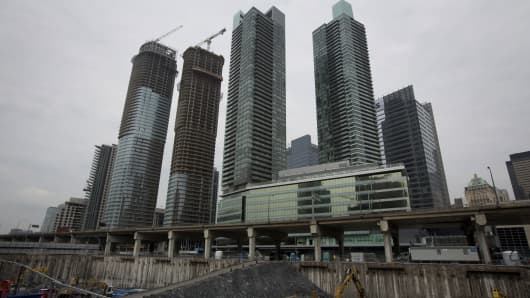Canada's overheated housing market continues to defy a U.S. style real estate crash, but even the most optimistic of investors are now bracing for pain ahead as prices continuing to rise and demand showing signs of tailing off.
National home sales were little changed on a month-over-month basis in July, according to statistics released on Thursday by The Canadian Real Estate Association (CREA). Inventory figures - another key measure of the balance between supply and demand - were also unchanged after standing above a ten-year average in July for about 70 percent of all local markets.
Whilst the CREA stated that the housing market has tightened but remains in "balanced territory", others aren't convinced.
(Read More: Fitch rings warning bell on Canadian banks)
"We appear to be perched precariously at the peak," Adam Peterson, a residential real estate investor with New York firm JEN Partners told CNBC. "Prices are holding on, but inventory and land transaction indicators are telling a different story."
Jonathan Tepper, CEO of research firm Variant Perception told CNBC that ex-Bank of Canada Governor Mark Carney has played a part in one of "biggest housing bubbles in the world". Meanwhile David Rosenberg, chief economist and strategist at Canadian wealth firm Gluskin Sheff believes that the housing downturn has been rather orderly so far, but warns of weakness to come despite housing demand currently holding firm in many urban areas.
(Read More: From Oh, Canada to 'O, Canada!': Retail's growth anthem)
House prices in Canada have doubled in the last ten years, according to the Teranet-National Bank Composite House Price Index. July's figure, released on Wednesday, showed overall prices rose 0.7 percent from a month earlier, the fifth straight monthly gain which pushed the index to a fresh all-time high.







